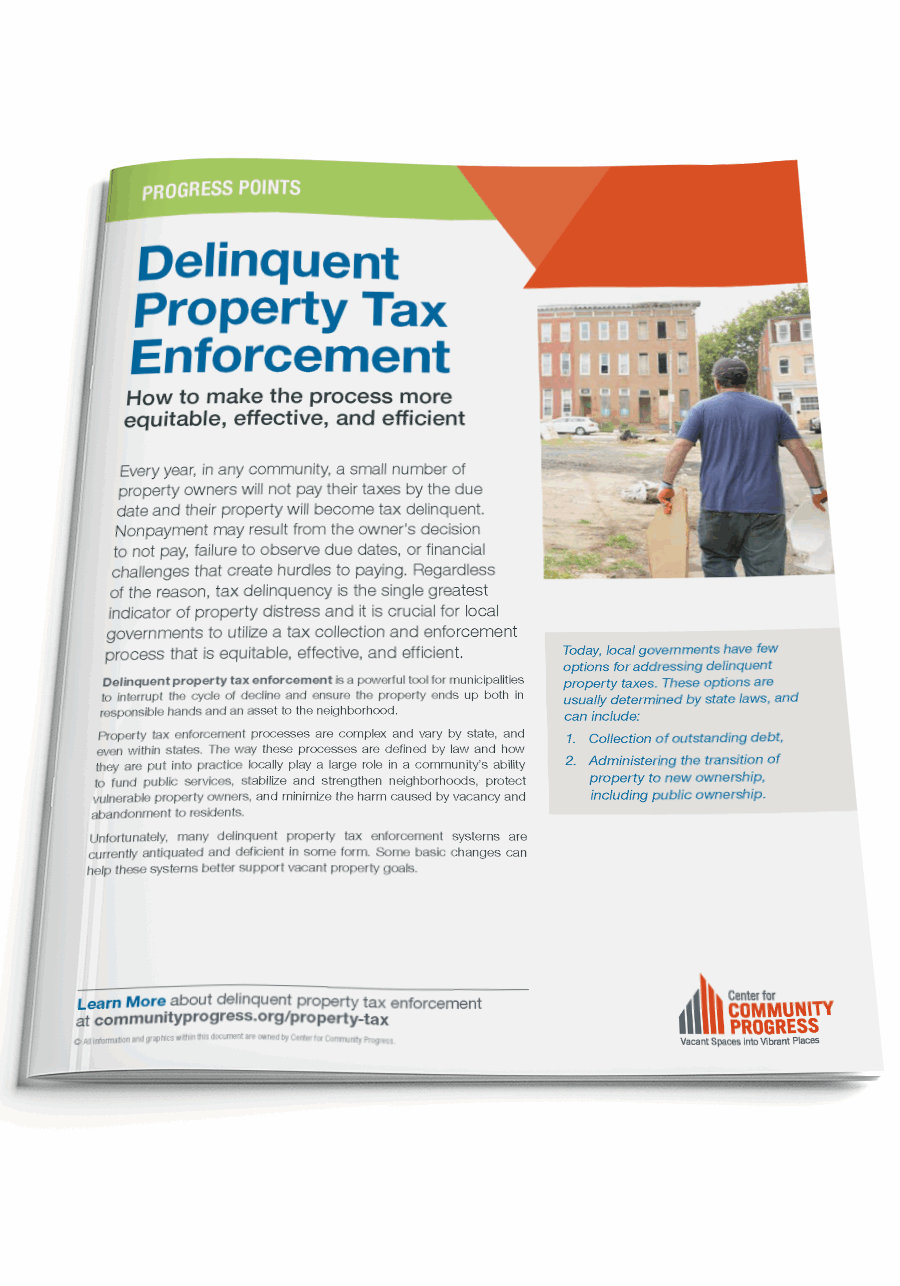Progress Points: Delinquent Property Tax Enforcement
A Brief Primer
Topic(s): Property Tax System
Published: January 2022
Geography: United States
Author(s): Center for Community Progress
Every year, in any community, a small number of property owners will not pay their taxes by the due date and their property will become tax delinquent. Nonpayment may result from the owner’s decision to not pay, failure to observe due dates, or financial challenges that create hurdles to paying. Regardless of the reason, tax delinquency is the single greatest indicator of property distress and it is crucial for local governments to utilize a tax collection and enforcement process that is equitable, effective, and efficient.
Delinquent property tax enforcement is a powerful tool for municipalities to interrupt the cycle of decline and ensure the property ends up both in responsible hands and an asset to the neighborhood. Property tax enforcement processes are complex and vary by state, and even within states. The way these processes are defined by law and how they are put into practice locally play a large role in a community’s ability to fund public services, stabilize and strengthen neighborhoods, protect vulnerable property owners, and minimize the harm caused by vacancy and abandonment to residents.
Unfortunately, many delinquent property tax enforcement systems are currently antiquated and deficient in some form. Some basic changes can help these systems better support vacant property goals.
Why take action on tax delinquent properties?
Tax delinquent properties have higher rates of vacancy, are more likely to have outstanding code violations, and inspire a higher frequency of calls to police and fire. Tax delinquent properties can sit vacant for many years, negatively impacting the value and safety of surrounding properties. In addition, property taxes are typically the largest source of revenue for local government and delinquent taxes will come at the cost of other services. Delinquent property tax enforcement is key to funding services that support a healthy, safe, and vibrant community.
Delinquent Property Tax Enforcement in Practice
The best delinquent property tax enforcement processes follow the three E’s: they are Equitable, Effective, and Efficient. Here is what that looks like in
practice:
Equitable
- Activate underutilized space
- Protect legacy residents and community members
- Add hardship payment plans for target populations
- Avoid foreclosures on small debts owed – set a minimum amount that must be exceeded before foreclosure can proceed
- Focus on delinquency outreach programs for targeted populations
- Direct interest and penalties to public purse
- Prevent tax liens sales to private third parties
Effective
- Yield maximum payments and redemptions
- Motivate compliance with compelling penalties and interest
- Avoid abandonment and deterioration
- Generate insurable and marketable property titles
- Allow a predictable transfer of property to responsible owner
Efficient
- Collect delinquent taxes in a timely manner
- Clarify redemption amount
- Leverage “automatic” time frames for each enforcement stage
- Leverage maximum notice
- Transfer the property and the debt to new ownership when there are unpaid taxes
Download and share this one-page explainer today.

Topic(s): Property Tax System
Published: January 2022
Geography: United States
Related Publications
Other Related Content
Subscribe to join 14,000 community development leaders getting the latest resources from top experts on vacant property revitalization.
